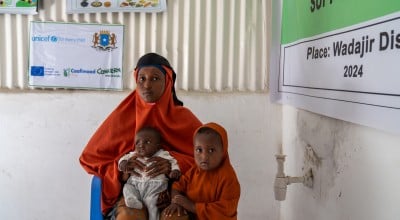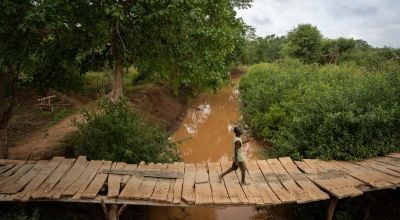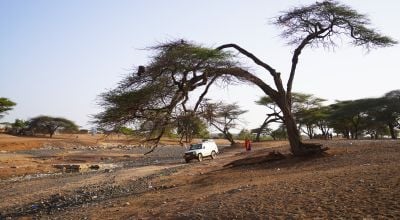
Read our 2024 annual report

Knowledge Hub
Time is running out as drought causes devastation in Somaliland
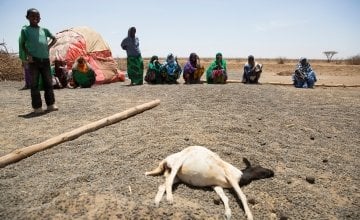
Scorched earth, scattered carcasses and struggling families. Concern’s Kieran McConville reports from the Gabiley region in Somaliland, where the worst drought in decades is devastating livestock and pushing families to the brink of starvation.
*Liban stands in the wind, dust and searing heat, staring at his feet, reluctant to make eye contact. It’s as if he’s somehow ashamed of what has happened here. But it’s not his fault.
All around us are dozens of scattered carcasses of dead sheep and goats.
“I came here with 150 animals,” he says. “Now I have 30.”
Behind him, beneath a flimsy shelter in a corral of thorny branches, lies the latest victim of this drought in this place – a sheep curled up as if sleeping.
“The conditions forced us to leave”
Liban* came here from the Togdher region of Somaliland, desperate to find pasture and water for his animals. To a pastoralist, livestock are everything – the difference between life and death. “The conditions forced us to leave,” he says.
He borrowed $400 to transport his flock the 500km here to the Gabiley region, about 60km from the Somaliland capital, Hargeisa. Normally this is one of the most fertile regions of the country – but the drought has struck hard here too and now all of the grazing is gone.
Stuck in an impossible position
Liban* arrived in October 2016 with his two sons, eleven year old Thalil* and eight year old Robble*. His wife and four other children stayed behind. By November, already weakened by hunger and stress, the animals started to die.
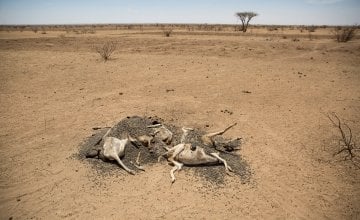
Now, deep in debt, and with his assets literally disappearing around him, Liban* and the two boys are entirely reliant on the generosity of local people for food. He is in an impossible position – stuck far from home and deeply worried for his family’s survival.
“This is the worst I’ve ever seen”
Liban* is not alone in this predicament. All across this region thousands of displaced families huddle in small shelters, watching their livelihoods slowly melt away. Ibraahin*, his face weathered and creased from 78 years of herding and hustling, has lost more than half of his flock. “This is the worst I’ve ever seen,” he says.
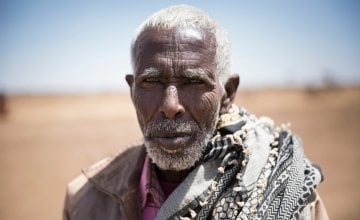
Bilan*, a young mother of three, tells us she has only five “shoat” – the local phrase for sheep and goats – surviving. “What can I do?” she says. “I will stay until the last one is gone.” The family is due to receive an emergency cash payment by mobile phone tomorrow, enough to keep them going for maybe another month.
Families devastated by drought
For others, though, the tragedy has struck even deeper. Hani* is a forty seven year old mother of seven children. She and her husband left Togdher with 459 animals – less than 60 have survived. Struggling to survive, the family are now completely dependent on the charity of others.
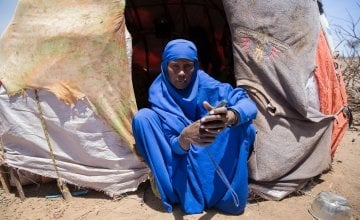
Dozens of families continue to arrive in Gabiley every day, in the hope of salvation. All they find is dust, hunger, and failure. Liban* surveys the devastation drought has brought to his flock. “We have nowhere else to go,” he says. “We are waiting on nobody, except maybe Allah.”
Concern is responding
Concern Worldwide, with support from ECHO, is providing water trucking services and mobile phone cash transfers to displaced families in Gabiley, Somaliland. At latest count, there are 20,000 displaced people scattered across the region.
Donate now
With the region on the brink of famine, time is running out for Awil, Safia and millions of others like them. Please give what you can today to help avoid further suffering.
Read more
- Hunger crisis sweeps across east Africa
- Famine sweeps two regions in South Sudan
- International community must “dig deep” to help South Sudan and Somalia
*All names have been changed for security purposes



